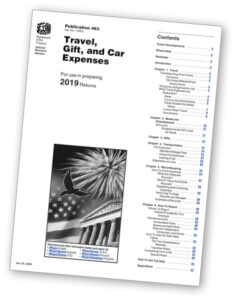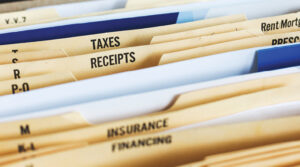How to Cut the Costs of Travel and Lodging
by Phillip M. Perry
If you attend trade shows on a regular basis, you’ve probably noticed that travel costs keep going up. Sending several people to an event can result in a serious hit to your bottom line.
Luckily, Uncle Sam allows you to soften the financial blow by deducting your travel expenses on your income tax return for any legitimate show. And what qualifies as legitimate? The answer is basically that the event must relate directly to your business.
“As long as you are expecting to generate business from the trade show, then expenses for attending are legitimate deductions,” says Richard R. Rhodes, an enrolled agent with Hinckley Tax Service, Medina, Ohio (hinckleytaxservice.com). “Even if you do not generate revenue directly from the event, you might be anticipating doing business in the future with someone you have networked with.”
Supporting Material
You can take specific steps to establish that your trip is a legitimate one for tax purposes. “The IRS wants to know the intent behind your travel,” says Suzette Flemming, president of Flemming Business Services, a financial management company based in Great Falls, Montana (flemmingbusinessservices.com). “Take notes that support the business nature of your trip. Whom did you see? What subjects did you discuss? How did activities during your trip support your operations?”
Retain any materials such as show badges or seminar workbooks that help prove you were actually at the event, says Flemming. Other helpful materials would be conference agendas with business-oriented sessions, a list of exhibitors who serve your organization, a catalog of relevant seminars (mark the ones you attended) and business cards and vendor brochures.
What To Deduct
Here is an important caveat: The ideas in this article are intended to provide you with initial guidance. You should always confer with qualified legal and accounting professionals to make sure you deduct expenses properly.
So what are some deductible expenses? Actual transportation costs are the most obvious. They can include travel by airplane, train, bus or automobile. Taxi or hired car travel during the trade show visit is also deductible. So are baggage costs, tips and what the IRS calls “ordinary and necessary expenses related to your business travel.” These might include rental fees for computers or other equipment.

Download IRS Publication 463
at https://bit.ly/2Keo7MA.
The Internal Revenue Service provides extensive guidance on the deduction of expenses in its publication Travel, Gift and Car Expenses. Visit www.irs.gov and search for “463.” For a complete list of deductible items in that publication see Table 1-1 on page 5. Additional information is available in another IRS document entitled Business Travel Expenses. Search the same site for “511.”
There are two special cases worth mentioning. First, meals are only 50 percent deductible. And their costs are not deductible at all if the trade show is close to home. On the other hand, if your travel requires an overnight stay then the 50 percent deductibility would be allowable. The IRS puts it this way in its publication Travel, Gift and Car Expenses: “You can deduct the cost of meals if it is necessary for you to stop for substantial sleep or rest to properly perform your duties while traveling away from home on business.”
Second, the 2017 Tax Cuts and Jobs Act (TCJA) eliminated the deductibility of entertainment—an expense commonly encountered by businesspeople attending trade shows.
“Loss of the entertainment deduction has hit many businesses pretty hard,” says Flemming. “Some are rethinking how they court clients.” How about your own business: Should you still entertain customers even though you cannot deduct the bill? “You need to look at your return on investment,” says Flemming. “Does the expense result in more business because it encourages customers to return?”
Careful Records
Despite the elimination of the entertainment deduction, there are still many legitimate deductions available to business travelers. And while they certainly soften travel’s bottom line impact, keep in mind that the system only works if you record and retain the requisite backup documentation. “Travel expenses, especially those for meals, are very often low hanging fruit for auditors,” says Rhodes. “That’s because many people fail to keep adequate records.”

If your paperwork does not support your deductions, they can be taken away. In addition to the increased taxes that will result, there may also be penalties and interest payments.
So how can you track your expenses in a way that will satisfy the authorities? The tried and true medium is paper—and many people still keep folders bulging with receipts. But with the arrival of the digital age, things can be a bit easier—at least for anyone comfortable with technology.
“Smart phone apps are especially valuable for keeping receipts of your meals,” says David Cawley, Partner and Certified Valuation Analyst at Fraim, Cawley & Company, CPAs, Roanoke, Virginia (fraimcpa.com). “You can just take pictures of your receipts and store them in a database.” Alternatively, you can have vendors email receipts to your smart phone. Then file the emails in a folder which is easier to access—and to back up—than faded paper files. (For computer programs that can help see the sidebar, “Apps That Track Expenses” on the next page.)
One more thing: Once you have your records in hand, hang onto them. “The IRS can go back three years when auditing your returns,” says Flemming. “If they find anything they can go even further back than that. So we recommend keeping documentation for seven years, which is as far back as the IRS can go.”
When it comes to state law, Flemming cautions, the rules can be more onerous. Montana, for example, can go back 10 years. “Find out what the rules are in your own state, because each one is different.”
Bonus tip: “Consider charging all of your business expenses on a dedicated credit card,” says Cawley. “Then you’ll have a permanent record of where you went and how much you spent.” And that credit card’s statements will provide an easily accessible journal of your business activities.
Per Diem Rates
Does collecting meal receipts—digital or otherwise—seem like a hassle? Ask your accountant if you are eligible to utilize “per diem” rates—daily cash amounts that are set by the government.
“Each year the IRS comes out with a per diem rate for each geographic area,” says Cawley. “The rule is that you can either deduct your actual expenses in terms of meals and incidentals or just use the per diem rate, based on how many days you are there. You should track both in tandem, then use whichever number is higher. This can be really handy in high per diem cities.”
The per diem option is often overlooked by business travelers. “Many people will deliberately keep their meal expenses low, because they are on a budget,” says Cawley. “But then they forget that they have a right under the IRS code to take the higher per diem rate. As a result they end up not getting their higher deduction.”
One more thing: Are you planning to use your personal car to travel to the show? If so, you face another decision: Whether to use the standard mileage rate or keep track of your actual expenses. The decision will lie in how good a record keeper you are and how much hassle you want to put up with. Sometimes the standard deduction is the easier option.
Personal Time
What if you spend some vacation or personal time during your trip? How does that affect the deductibility of your expenses? An excerpt from IRS document 463 provides some clarification: “You can deduct all of your travel expenses if your trip was entirely business-related. If your trip was primarily for business and, while at your business destination, you extended your stay for a vacation, made a personal side trip, or had other personal activities, you can deduct only your business-related travel expenses.”
It’s important to keep careful records about your journey, allocating correctly between business and personal time. “My overall tip is to be truthful,” says Catherine Raker, an accountant with Cendrowski Corporate Advisors, Chicago (cca-advisors.com). “If it’s really a personal trip and you do some business-related activities don’t write the whole trip off as a business expense.”
Expenses that are shared for business and vacation can fall into a grey area, according to Cawley. “Your airline fare might be disallowed if you spend two days of your trip on business and five days on vacation. On the other hand, your hotel bill for the specific two business days, and other direct expenses for the business portion of your trip, would still be deductible.”
Personal time often means the presence of a spouse—and expenses related to that individual’s travel can complicate record keeping. Ordinarily such expenses must be separated from those of the business traveler and may not be deducted. There is one exception: “If you are traveling with your spouse who is participating for a genuine business reason in the event, then that individual’s expenses are covered,” says Flemming.
Keeping Track
Trade shows can be valuable resources for your business. By bringing together vendors and buyers in one place, they facilitate more buying activity and higher profits. Taking the time to document your activity when you travel to a show can help alleviate the costly impact travel and hotel expenses can have on your bottom line.
“It can be hard to keep careful records when you are busy, but those records do help come income tax time,” says Cawley. “Tracking your travel expenses when you attend a trade show can really pay off.” GSCB





















